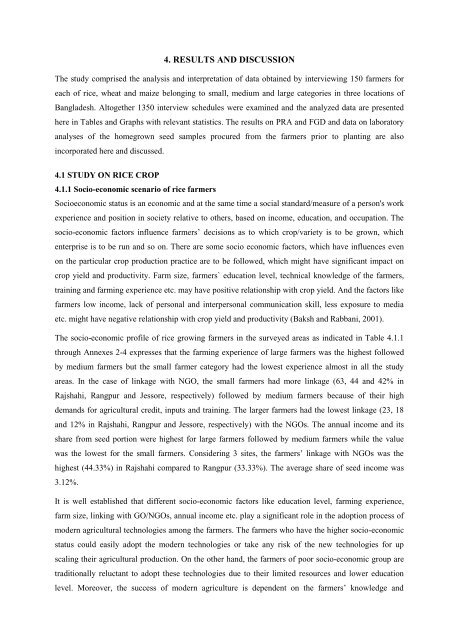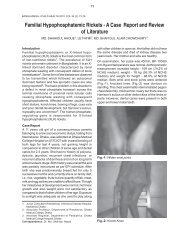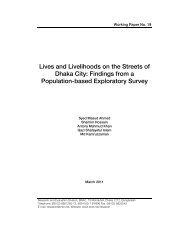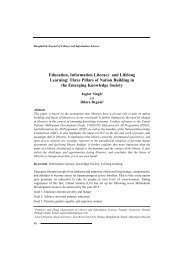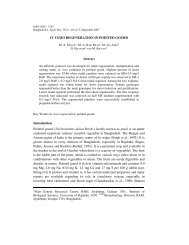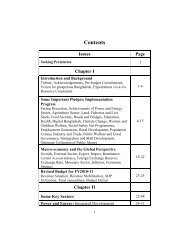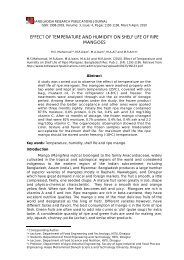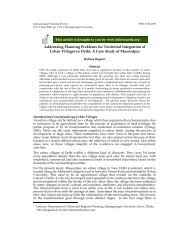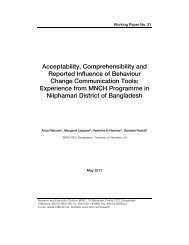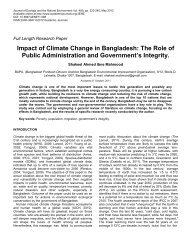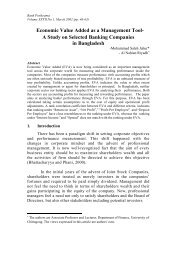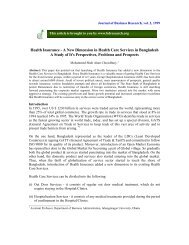Studies on Policy Option for Quality Seed Production and ... - NFPCSP
Studies on Policy Option for Quality Seed Production and ... - NFPCSP
Studies on Policy Option for Quality Seed Production and ... - NFPCSP
You also want an ePaper? Increase the reach of your titles
YUMPU automatically turns print PDFs into web optimized ePapers that Google loves.
4. RESULTS AND DISCUSSIONThe study comprised the analysis <strong>and</strong> interpretati<strong>on</strong> of data obtained by interviewing 150 farmers <strong>for</strong>each of rice, wheat <strong>and</strong> maize bel<strong>on</strong>ging to small, medium <strong>and</strong> large categories in three locati<strong>on</strong>s ofBangladesh. Altogether 1350 interview schedules were examined <strong>and</strong> the analyzed data are presentedhere in Tables <strong>and</strong> Graphs with relevant statistics. The results <strong>on</strong> PRA <strong>and</strong> FGD <strong>and</strong> data <strong>on</strong> laboratoryanalyses of the homegrown seed samples procured from the farmers prior to planting are alsoincorporated here <strong>and</strong> discussed.4.1 STUDY ON RICE CROP4.1.1 Socio-ec<strong>on</strong>omic scenario of rice farmersSocioec<strong>on</strong>omic status is an ec<strong>on</strong>omic <strong>and</strong> at the same time a social st<strong>and</strong>ard/measure of a pers<strong>on</strong>'s workexperience <strong>and</strong> positi<strong>on</strong> in society relative to others, based <strong>on</strong> income, educati<strong>on</strong>, <strong>and</strong> occupati<strong>on</strong>. Thesocio-ec<strong>on</strong>omic factors influence farmers’ decisi<strong>on</strong>s as to which crop/variety is to be grown, whichenterprise is to be run <strong>and</strong> so <strong>on</strong>. There are some socio ec<strong>on</strong>omic factors, which have influences even<strong>on</strong> the particular crop producti<strong>on</strong> practice are to be followed, which might have significant impact <strong>on</strong>crop yield <strong>and</strong> productivity. Farm size, farmers` educati<strong>on</strong> level, technical knowledge of the farmers,training <strong>and</strong> farming experience etc. may have positive relati<strong>on</strong>ship with crop yield. And the factors likefarmers low income, lack of pers<strong>on</strong>al <strong>and</strong> interpers<strong>on</strong>al communicati<strong>on</strong> skill, less exposure to mediaetc. might have negative relati<strong>on</strong>ship with crop yield <strong>and</strong> productivity (Baksh <strong>and</strong> Rabbani, 2001).The socio-ec<strong>on</strong>omic profile of rice growing farmers in the surveyed areas as indicated in Table 4.1.1through Annexes 2-4 expresses that the farming experience of large farmers was the highest followedby medium farmers but the small farmer category had the lowest experience almost in all the studyareas. In the case of linkage with NGO, the small farmers had more linkage (63, 44 <strong>and</strong> 42% inRajshahi, Rangpur <strong>and</strong> Jessore, respectively) followed by medium farmers because of their highdem<strong>and</strong>s <strong>for</strong> agricultural credit, inputs <strong>and</strong> training. The larger farmers had the lowest linkage (23, 18<strong>and</strong> 12% in Rajshahi, Rangpur <strong>and</strong> Jessore, respectively) with the NGOs. The annual income <strong>and</strong> itsshare from seed porti<strong>on</strong> were highest <strong>for</strong> large farmers followed by medium farmers while the valuewas the lowest <strong>for</strong> the small farmers. C<strong>on</strong>sidering 3 sites, the farmers’ linkage with NGOs was thehighest (44.33%) in Rajshahi compared to Rangpur (33.33%). The aver age share of seed income was3.12%.It is well established that different socio-ec<strong>on</strong>omic factors like educati<strong>on</strong> level, farming experience,farm size, linking with GO/NGOs, annual income etc. play a significant role in the adopti<strong>on</strong> process ofmodern agricultural technologies am<strong>on</strong>g the farmers. The farmers who have the higher socio-ec<strong>on</strong>omicstatus could easily adopt the modern technologies or take any risk of the new technologies <strong>for</strong> upscaling their agricultural producti<strong>on</strong>. On the other h<strong>and</strong>, the farmers of poor socio-ec<strong>on</strong>omic group aretraditi<strong>on</strong>ally reluctant to adopt these technologies due to their limited resources <strong>and</strong> lower educati<strong>on</strong>level. Moreover, the success of modern agriculture is dependent <strong>on</strong> the farmers’ knowledge <strong>and</strong>


